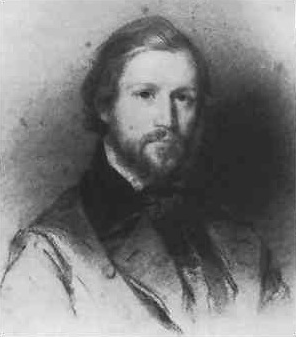He was a strange man, a macabre man, the composer of the “Funeral March for a Papagallo.” Everything about Charles-Valentin Alkan seemed eccentric—even his death on March 29th, 1888.
After more than a hundred years, the circumstances of Alkan’s death are still controversial. The most common story has it that he was found “crushed beneath his upturned bookcase from which he had been extracting a Hebrew religious book.” [According to this version of Alkan’s demise, the old composer was found still clutching the Talmud, his beloved book of Jewish law, which customarily is kept on the top shelf so that no other book can be placed above it.]
In 1909 Alexandre de Bertha published an article describing a more mundane death for Alkan. According to Bertha, Alkan was found stretched out on his kitchen floor, in front of the stove, which he had probably been about to light in preparation for his evening meal. But this account tells neither how Alkan died nor who discovered the body. All it gives us is a curious allusion to a fatal situation in Alkan’s apartment “brought on by his unusual habits.”
News with a little more humanity
WPR’s “Wisconsin Today” newsletter keeps you connected to the state you love without feeling overwhelmed. No paywall. No agenda. No corporate filter.
All references to an accident have been traced to a single source–one Isidore Phillipp who was 23 years old at the time of Alkan’s death, and who claimed to have been one of the group that pulled Alkan’s body from beneath the bookcase. Phillip was known to be essentially a truthful person who liked to emphasize the grotesque.
Yet the police archives from the time mention no accident in Alkan’s apartment. The primary reaction to the composer’s death seems to have been surprise that he hadn’t already been dead for years. Aside from his immediate family, only four mourners attended his funeral at Paris’ Montmartre Cemetery on a damp, dreary Easter Sunday. The four were a business associate, a violinist and Bertha and Philipp–the authors of the two contradictory accounts of Alkan’s death. It was a case worthy of an investigator who made his debut in that year of 1888–Sherlock Holmes.
Wisconsin Public Radio, © Copyright 2026, Board of Regents of the University of Wisconsin System and Wisconsin Educational Communications Board.





